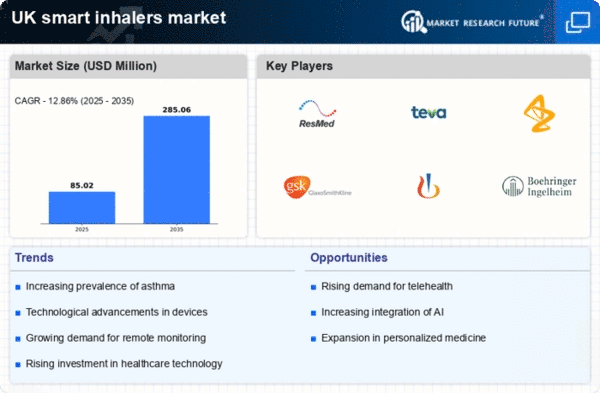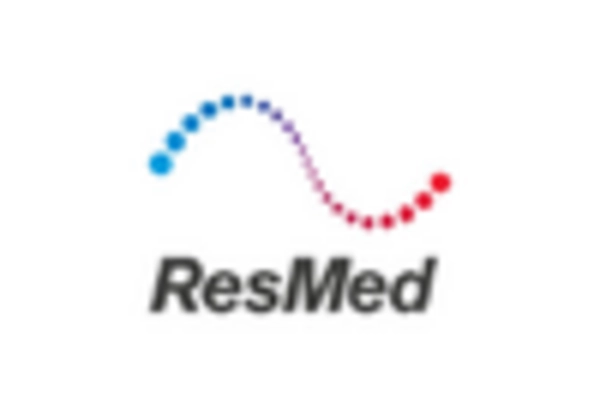Government Initiatives and Funding
Government initiatives and funding aimed at enhancing healthcare technology are pivotal in driving the smart inhalers market. The UK government has been actively promoting digital health solutions through various funding programs and initiatives. For instance, the NHS Long Term Plan emphasizes the integration of technology in healthcare, which includes the adoption of smart inhalers. Such initiatives not only provide financial support for research and development but also encourage collaboration between public and private sectors. This supportive environment is likely to foster innovation and accelerate the introduction of smart inhalers into the market, thereby enhancing patient care and outcomes.
Growing Awareness of Medication Adherence
There is a growing awareness of the importance of medication adherence among patients and healthcare providers, which is influencing the smart inhalers market. Non-adherence to prescribed medication regimens is a significant challenge in managing chronic respiratory diseases. Smart inhalers address this issue by incorporating features that remind patients to take their medication and track their usage patterns. In the UK, initiatives aimed at educating patients about the benefits of adherence are gaining traction, potentially leading to increased adoption of smart inhalers. This heightened awareness may contribute to improved health outcomes and reduced healthcare costs, further driving the market.
Rising Prevalence of Respiratory Diseases
The increasing prevalence of respiratory diseases in the UK is a significant driver for the smart inhalers market. Conditions such as asthma and chronic obstructive pulmonary disease (COPD) affect millions, necessitating effective management solutions. According to recent health statistics, approximately 5.4 million people in the UK are currently receiving treatment for asthma, highlighting the urgent need for innovative inhalation devices. Smart inhalers offer features that facilitate better disease management, such as reminders for medication use and tracking of symptoms. This growing patient population is likely to propel demand for smart inhalers, as they provide a more efficient means of managing chronic respiratory conditions.
Technological Advancements in Inhaler Design
The smart inhalers market is experiencing a surge due to rapid technological advancements in inhaler design. Innovations such as integrated sensors and mobile connectivity enhance medication adherence and patient monitoring. In the UK, the market is projected to grow at a CAGR of approximately 15% from 2025 to 2030, driven by these advancements. The incorporation of real-time data tracking allows healthcare providers to tailor treatment plans more effectively, thereby improving patient outcomes. Furthermore, the ability to collect and analyze usage data empowers patients to manage their conditions proactively. This trend indicates a shift towards more personalized healthcare solutions, which is likely to further stimulate growth in the smart inhalers market.
Integration of Artificial Intelligence in Healthcare
The integration of artificial intelligence (AI) in healthcare is emerging as a transformative force. This trend is particularly evident in the smart inhalers market. AI technologies enable the analysis of vast amounts of patient data, facilitating personalized treatment plans and predictive analytics. In the UK, the application of AI in smart inhalers can enhance the monitoring of patient adherence and provide insights into medication effectiveness. This capability not only improves patient engagement but also allows healthcare providers to make informed decisions based on real-time data. As AI continues to evolve, its potential to revolutionize the smart inhalers market appears substantial, suggesting a future where inhaler technology is more responsive to individual patient needs.

















